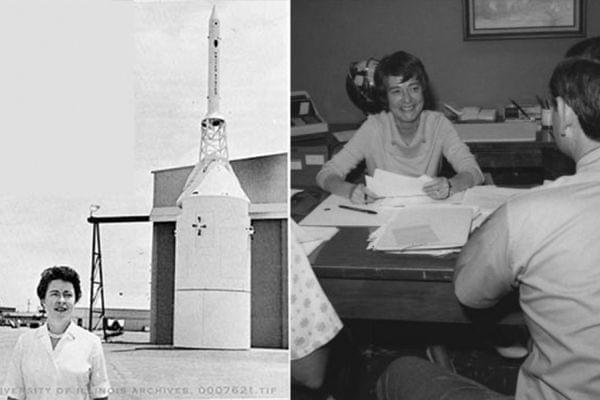ENCORE: An Illinois Woman’s Role In The Moon Landing; ‘Sober Curious’ And Non-Alcoholic Drinks; NCAA Coaches And Health Decisions

Barbara Crawford Johnson walks past Apollo spacecraft simulator en route to her office at North American Aviation in 1963, where she heads the department responsible for plotting the return course of the Apollo moon rocket (left). Barbara Crawford Johnson speaks to co-workers in her office, circa 1970-1974 (right). Wikimedia Commons(CC BY-SA 4.0)
Fifty years ago, an Illinois engineer named Barbara Crawford Johnson helped land astronauts on the moon. She was from Sandoval and graduated from the U of I. Today, we learn about her life, and what it was like to work on the space program all those years ago. Plus, there are many reasons why people don’t drink alcohol, and those numbers of people continue to grow. How are bars and restaurants starting to cater cocktails to the sober set? Also, a study finds that just half of collegiate level sports programs follow the medical model of care for student athletes.
An Illinois Woman’s Role In The Moon Landing
Fifty years ago, Americans switched on their TVs and radios to follow the Apollo 11 mission.
You know Neil Armstrong’s name of course. And you’ve heard those famous words, one small step and all that. But there were so many people, and women in particular, behind the moon landing - including scientists, mathematicians, and engineers, who until recently, have flown under the radar for the work they did in getting the United States to space.
That’s one woman who played a crucial role in the Apollo program: Barbara Crawford Johnson. Born in Sandoval, Illinois and a U of I alumna, Barbara, or “Bobbie,” as she was known, worked her way to a supervisory position in the Apollo Lunar Landing Program. She also played roles on the Navajo missile and the Space Shuttle program. And today we’re going to spend some time getting to know her.
Angie Wolters featured Bobbie in her book, Women and Ideas in Engineering: Twelve Stories from Illinois. She’s the director of Women in Engineering at the Grainger College of Engineering. Zach Putnam is an assistant professor of aerospace engineering.
Niala Boodhoo spoke with both of them back in July
‘Sober Curious’ And Non-Alcoholic Drinks
There can be many different reasons for someone to stop drinking alcohol. Maybe they’re concerned about health or addiction or maybe they’re just curious what it would be like. Whatever the reason, one thing seems to be clear: more people are trying sobriety.
About half of U.S. adults, and two thirds of young adults, say they’re trying to drink less. That’s according to data from Nielsen. Companies in the alcohol industry seem to be taking note as well. Heineken and Budweiser recently rolled out no-alcohol beers, and a number of craft breweries are experimenting with low-alcohol options. There’s also been an emergence of sober bars which provide the social scene minus the alcohol.
This summer, Niala Boodhoo spoke with Ruby Warrington. She’s the author of the book Sober Curious and she also hosts a podcast by the same name. Rachel Sugar also joined us from New York. She wrote about her exploration of sobriety and non-alcoholic drinks for Bon Appetit.
NCAA Coaches And Health Decisions
College sports are big business in our country. How big? Every year the NCAA, the nonprofit that runs college athletics, takes in close to $8 billion. Alabama football coach Nick Saban took home a salary of more than $8 million last year.
Here in Illinois, U of I football coach Lovie Smith signed a six-year, $21 million contract in 2016. His current salary puts him in the top 15 highest paid coaches in college football. He also got a $1 million bonus this year.
But, all that money means more pressure on coaches and athletes to produce success.
Now, a new survey from the Intercollegiate Council for Sports Medicine finds that coaches of college teams sometimes pressure trainers over their medical decisions. About three in five of the athletic trainers surveyed said they had been pressured at some point by non-medical personnel about athlete health, with many saying it happened more than twice a month.
These decisions can have deadly consequences for the players involved. Overworked athletes can land in the hospital or even lose their lives if their health is not prioritized.
Dave Ridpath is an Associate Professor of Sports Management at Ohio University where he teaches about intercollegiate athletics. He spoke with Niala Boodhoo this summer.

